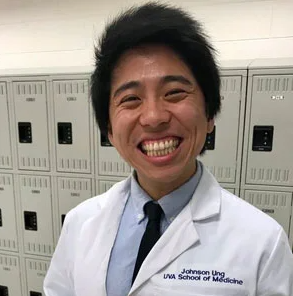Johnson Ung, a graduate student in the Loughran lab, has won the Graduate Biosciences Society Student Leadership Award for 2025. This student-nominated award recognizes graduate students in the Biosciences who have made outstanding and notable academic, professional, social, and/or service contributions for the University of Virginia and the local community.
Johnson earned his BS in Biology and Chemistry from the University of Redlands and graduated Summa Cum Laude and Phi Beta Kappa. He joined the laboratory of Dr. Tom Loughran Jr, UVA Cancer Center Director, in February 2020. The group studies blood cancers with a specific focus on large granular lymphocyte leukemia, peripheral T cell lymphoma, and acute myeloid leukemia.
We asked Johnson to tell us about his research and his hopes for the future. Here’s what he said:
Can you tell us about your research?
I studied acute myeloid leukemia (AML), which is a devastating blood cancer with limited treatment options. In general, patients with AML are treated with intensive combination chemotherapy (for chemotherapy-eligible patients) or drug combinations containing the BCL-2 inhibitor venetoclax (for chemotherapy-ineligible patients). Unfortunately, most individuals relapse due in part to drug resistance.
My doctoral work aimed to target dysregulated sphingolipid metabolism as a novel therapeutic approach for AML. Ceramides are a class of sphingolipids with tumor-suppressive properties. Ceramide accumulation from exogenous supplementation, as part of the cytotoxic mechanism of existing anti-cancer drugs, or from the inhibition of ceramide-catabolizing pathways induces cell death in cancer. We and others have shown that AML cells leverage multiple pathways to mitigate the cytotoxic effects of ceramide. One such ceramide-detoxifying mechanism is through the action of acid ceramidase, a ceramide-catabolizing enzyme. Past work from our group demonstrated that acid ceramidase is upregulated in acute myeloid leukemia and promotes both leukemic survival and drug resistance. Our prior work also assessed the anti-leukemic properties of the ceramide analog and acid ceramidase inhibitor, SACLAC, in AML.
To expand on this work, my research evaluated new small molecule acid ceramidase inhibitors and assessed their ability to overcome drug resistance in AML. Specifically, I characterized the anti-leukemic efficacy and cytotoxic mechanisms of a newer acid ceramidase inhibitor, LCL-805, in AML and found that it induced cell death in part by antagonizing AKT signaling. As mentioned above, resistance to the BCL-2 inhibitor in AML is a clinical challenge. Using the two different acid ceramidase inhibitors LCL-805 and SACLAC, I evaluated the utility of inhibiting acid ceramidase to enhance venetoclax cytotoxicity in venetoclax-resistant AML. I showed that acid ceramidase inhibition enhanced venetoclax efficacy in AML cell lines with either primary or acquired venetoclax resistance. Mechanistically, co-targeting acid ceramidase and BCL-2 induced significant levels of ceramide accumulation which activated a cytotoxic integrated stress response and resulted in caspase-dependent cell death. These data support additional characterization of sphingolipid dysregulation in AML and the development of novel sphingolipid-modulating drugs as standalone therapeutics or to augment existing AML drugs.
What drives or motivates your scientific pursuits?
Ultimately, helping people is what drives my scientific pursuits. Growing up, I’d always been someone who wanted to help people and contribute to the greater good. Throughout high school, college, and into my fellowship, I fell in love with science and that desire evolved into an interest in translational medicine and cancer research. As a research fellow in the Lum Lab, I interacted face-to-face with dozens of late-stage cancer patients and these interactions always affirmed my decision to study cancer. Moreover, as a first-generation graduate student, I’ve developed an immense appreciation for mentorship and paying it forward to honor the many mentors who supported me over the last few decades. Thus, my two driving factors are to develop new and improved treatment options for cancer patients and support the training of the next generation of researchers.
What are your future goals?
In the immediate future, I will be pursuing a postdoctoral fellowship at the Dana-Farber Cancer Institute to work with Dr. Anthony Letai, a cancer cell death signaling expert and the investigator who pioneered the development of the BCL-2 inhibitor venetoclax in AML and helped support its accelerated FDA approval in 2018. In the long term, I am interested in a cancer research-facing career in academia, industry, or government where I can both develop novel anti-cancer drugs and support the training of early-career investigators.
Congratulations on winning this award, Johnson!
